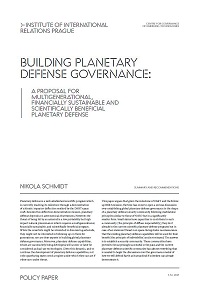Building planetary defense governance: a proposal for multigenerational, financially sustainable and scientifically beneficial planetary defense
Building planetary defense governance: a proposal for multigenerational, financially sustainable and scientifically beneficial planetary defense
Author(s): Nikola Schmidt
Subject(s): Governance, Security and defense
Published by: Ústav mezinárodních vztahů
Keywords: defense governance; Planetary defense; threat;
Summary/Abstract: Planetary defense is a well-established scientific program which is currently reaching its milestone through a demonstration of a kinetic impactor deflection method by the DART space craft. Besides this deflection demonstration mission, planetary defense depends on astronomical observations. However, the threat of being hit by an asteroid is a low probability but high impact natural phenomenon which requires a multigenerational, financially sustainable, and scientifically beneficial program. While the scientists might be interested in discovering asteroids, they might not be interested in following up on them for generations; nor are they experts in building global planetary defense governance. Moreover, planetary defense capabilities, which are successively being developed, will sooner or later be considered as dual-use technologies. Given this dynamic, and to continue the development of planetary defense capabilities, not only spacefaring states need a regime under which they can act if others are under threat. This paper argues that given the milestone of DART and the follow-up HERA mission, the time has come to open a serious discussion over establishing global planetary defense governance in the shape of a planetary defense security community following multilateral principles similar to those of NATO but in a significantly smaller form. Small states have capacities to contribute to such a community (the principle of diffuse responsibility); they do it already in the current scientific planetary defense programs but in case of an imminent threat non-space-faring states need assurance that the existing planetary defense capabilities will be used for their benefit (the principle of indivisibility) and not misused. The answer is to establish a security community. These communities have proved to be surprisingly successful in the past, and the current planetary defense scientific community has almost everything that is needed to begin the discussions over the governance model of how we will defend Earth as humankind if scientists can already demonstrate it.
Series: IIR — POLICY PAPERS
- Page Count: 7
- Publication Year: 2021
- Language: English
- Content File-PDF

